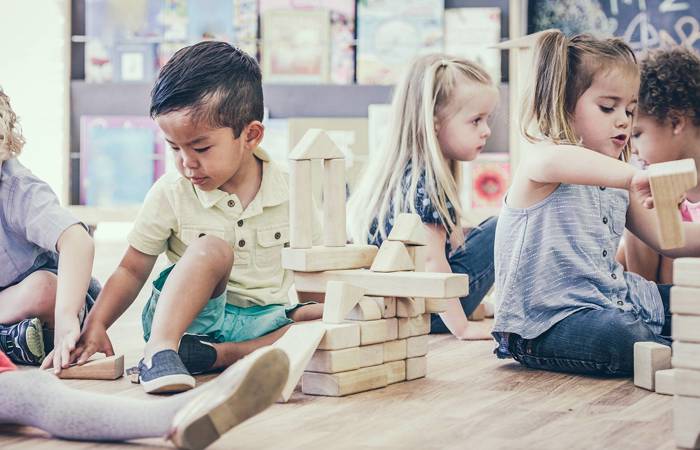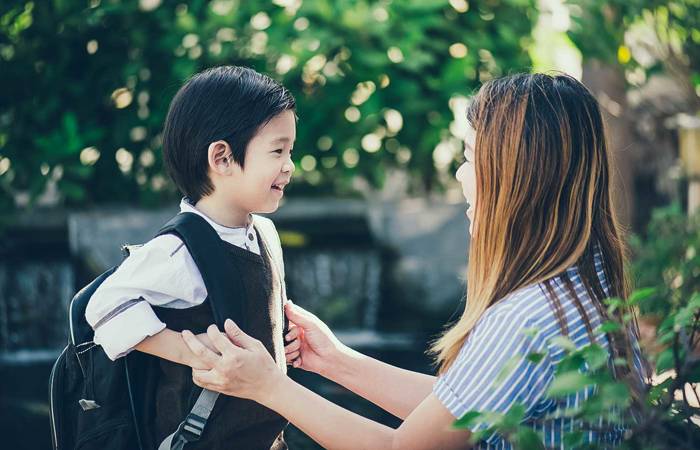Like what you see?
Sign up to receive more free parenting advice.
Thank you for subscribing to our newsletter!
Lifestyle

Credit: iStock.com/skynesher
Starting at an early learning centre for the first time is an experience parents often ease their child into. While every child is different, some need time to adapt.
But what happens later if, when your child is settled and enjoying the interactions with educators and friends, suddenly you need to take a break?
Time away from early learning can happen for many reasons. It could be due to something joyful such as a long family holiday, or for more challenging reasons – a family illness or personal situation which will mean your child is absent for an extended period.
Either way, it’s worth considering how to keep your child connected during their absence and how to smooth their transition back into the centre on your return.
Professor Marilyn Fleer is the Foundation Chair in Early Childhood Education and Development at Monash University and the Australian Research Council Kathleen Fitzpatrick Laureate Fellow.
She says the first thing parents should realise is that while absences may be planned or unplanned, they aren’t necessarily a negative.
“Parents feel guilty over all sorts of things. I encourage parents in this position to think about the positives,” Professor Fleer says.
Professor Fleer says families who are away for travel will discover many benefits.
“The children are experiencing lots of new things and parents become their narrators, explaining the world they are experiencing. It’s wonderful for language development as there’s lots of talk happening in the family that is different to what is happening in the childcare centre,” Professor Fleer says.
An opportunity for language development
As an example, the challenges and differences that come up on holidays can open up new narratives.
“Children will ask interesting questions about everything from time zones to new plumbing, so this brings some cognitive benefits. Plus, as you are talking a lot, you are naming new things, tasting new foods and probably having more time together as a family, so it becomes a beautiful opportunity for language development and social family development,” Professor Fleer says.
Of course, absences aren’t always planned or for something as joyful as travel. Perhaps a grandparent is sick interstate and the family needs to step in for a while to take on a caring role. Even in this case, Professor Fleer says there is a lot to be learned during the time away.
“It can become a very rich experience for a child. They are learning another set of important things, such as how to care for someone they love. They might learn about different types of medical professions: these are rich insights that can be capitalised on back in childcare,” Professor Fleer says.
In a caring situation, Professor Fleer says it’s important to help children feel part of the bigger picture, particularly for preschoolers.
“Could you make them a nurse’s hat or doctor’s hat? Are they the person who looks after the thermometer or makes sure Grandma’s glass of water is filled by the bed? That way they have a kind of responsibility,” she says.
“They can have books and pretend to read to Grandma. Most four-year-olds can’t read words, but they can read pictures of their favourite story,” Professor Fleer adds.
Stay up to date with the latest news and articles from First Five Years
Thank you for subscribing to our newsletter!
Supporting your return
Just as parents plan for their original transition into an early learning centre, it can be worth considering how to transition into your child’s return.
Sue Robb is the General Manager of Pedagogy and Practice at Goodstart Early Learning. She says it’s useful for the centre and the family to work out together what is the best way for the child to stay in touch.
“If a child has an extended break some centres have a bear that the child can take with them. They can take photos of the bear and the child on their travels,” Sue says.
Professor Fleer agrees.
“For a more technology-focused centre, photos [or videos] could be sent back and forth via something like a What’s App account, while for a more organic centre the child could collect or send postcards back,” she says.
Some children will handle a break better than others, although Professor Fleer says predicting which child will fall into which category is difficult.
“Preparation can help, especially for the older children. Friendships matter for four-year-olds. Some children are really good at entering back in, but if there’s a special bond between a certain group and that play evolves over time that can be difficult,” she says.
Educators can also help in the lead up to a child’s return.
“They could say ‘Ollie’s away, but when we have fruit together this is where he sits, so we will put a seat out for him anyway.’ Children quite like that – as they can imagine the child and keep them alive in the centre. That might be more important for some children than others, but it does leave the friendship circle open to re-enter more easily,” Professor Fleer says.
At the same time, parents can reconnect their child before their return, by having a ‘pretend’ day at childcare together.
“You can do the routine for a day wherever you are– for example, have your fruit at the floor and other things they do there. You might still go out and do things – but say, ‘Today at preschool we are going on an excursion and we are going to the Eiffel Tower’,” she says.
The first day back
Professor Fleer says that if time allows it can be worth going slow at drop off time and pick up on day one.
“It’s also nice to have a day where the child can go with their parent or carer and just visit everybody and bring something special along, like a photo album. You’ll have a sense if they want to stay,” she says.
On the first ‘real’ day back, parents can make it easier for children to talk about their time away by adding some ‘surprises’. Parents could put a postcard or a small object from the trip in their child’s lunchbox.
“It’s almost like a transition object. The other children will want to look, so it opens up a space for them to ask about their time away. Children need a little bit of scaffolding to do that and this makes it easier,” Professor Fleer says.






